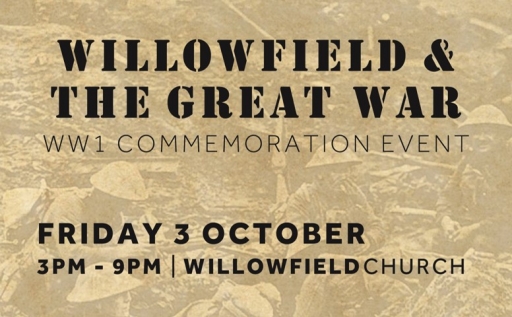East Belfast & The Great War, a First World War commemoration project, has just announced the first date in a series of ‘Military Antiques Roadshows’. This report by
Centenary News’s Christopher J Harvie.
From 3-6 pm, Friday 3d October, at Willowfield Parish Church, Belfast, a First World War Antiques Roadshow will be hosted by East Belfast & The Great War (EBGW).
As part of a day long event “Willowfield and the Great War”, the general public are encouraged to attend and to bring any artefacts, documents or memorabilia they might have relating to WWI for interpretation, discussion and digital preservation.
Jonathan Evershed, head of EBGW, says: “A vital part of this project is seeking to understand how the Great War was experienced by the men and women of East Belfast, and central to this are family heirlooms like letters, diaries, photographs and medals. These can help us to tell the very human story of the War.”
Community Appeal
Featured at the event will be a display of artefacts from “War Years Remembered”, a mobile museum of collected pieces travelling to schools and public events throughout the UK and Ireland to allow a hands-on approach to history. Also, researchers from the Living Legacies 1914-18 Engagement Centre will be present to help interpret objects and artefacts with the ability to digitally record them for future preservation. The records and digital captures will be hosted on the EBGW website. It is hoped that members of the East Belfast community will come forward with relatives’ stories and artefacts to help make the event a success.
Digital Preservation
Living Legacies 1914-18 Engagement Centre, based at Queen’s University Belfast and in collaboration with academics from several UK universities is dedicated to researching the “enduring legacies of the First World War.” Its digital heritage branch, headed by Dr Paul Ell and Dr Keith Lilley, aims to support community research projects in digitally recording “objects and artefacts, photographs and images, written materials, performances, built heritage and landscapes.”
The Project
Headed by Jonathan Evershed of Queen’s University and coordinated by historian Jason Burke, EBGW is a project created with the goal of building a database detailing every service member (from all branches) of East Belfast during WWI. Their website launched in August 2014 and will continue to promote this project – both on the site itself and through social media – with updates on the developing research. The vision is to have a fully searchable, free to use database of the compiled records go live in July 2016. Mr Burke says: “A key aim of the project is to broaden community engagement with, and understanding of, First World War heritage in East Belfast.”
The Roadshows
Part of this broadening engagement is the Military Antiques Roadshows. The upcoming event in October is to be the first of many events which have yet to be formally announced. As well as allowing community involvement and engagement in helping to build the project’s database, the Roadshow will conclude with artistic presentations, music and an address by Jason Burke.
HLF Funding
EBGW has received Heritage Lottery funding. It was announced in August that the Fund awarded £10,000 to the project. EBGW’s website provides this quote from Mark Glover, Heritage Lottery Fund Northern Ireland Committee Member, explaining the importance of the project: “Heritage Lottery Fund was delighted to fund this First World War project which seeks to explore and share not only the First World War stories of individual men and women from East Belfast but also delves into the legacy of the First World War on the local community. Across the UK Heritage Lottery Fund has awarded more than £4million to 500 community projects through our dedicated First World War: Then and Now Programme. The First World War had a lasting impact on communities across the UK and we have been astounded at the sheer breadth of stories people have been uncovering. East Belfast and the Great War project will not only enrich the local understanding of the First World War but will add East Belfast stories into the UK’s collective understanding of First World War.”
